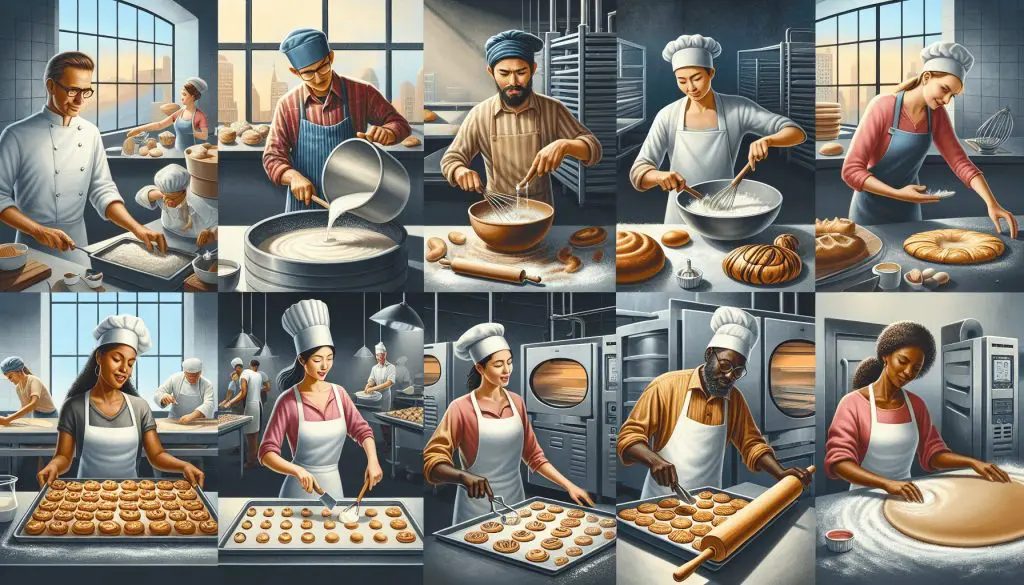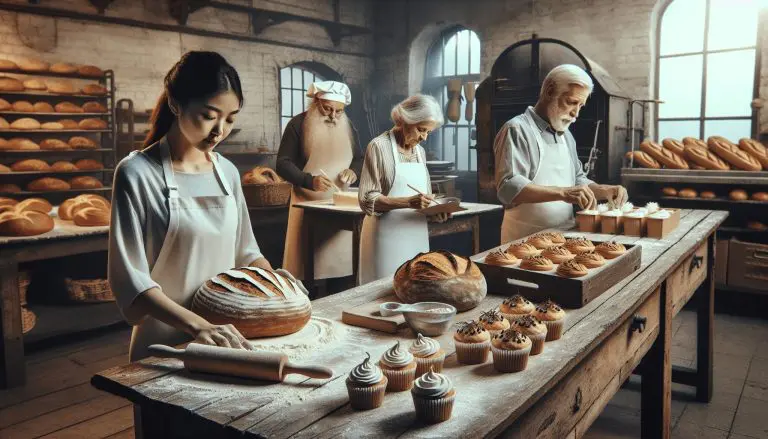Imagine a master conductor leading an orchestra. Now, picture this conductor using a rolling pin instead of a baton and recipes instead of music sheets. Welcome to a bakery, where each day is a planned mix of different textures and flavors.
We’ll take a look at a baker’s daily routine and show you how to make your bakery successful.
Recommended reading: Discover how to orchestrate your bakery’s success with key staffing strategies and learn how to hire, keep, and manage the right team to improve work efficiency and keep your customers happy.
Our experienced drivers handle delicate baked goods with care, ensuring every cake, pastry, and loaf arrives intact
Deliver Baked Goods Safely Now
Average Bakery Revenue 💰
Bakeries in the United States have an average revenue ranging between $325,000 and $450,000 annually, indicating the potential for profitability despite lower average revenues compared to restaurants, thanks to lower labor and food costs associated with bakery operations.
Lower your delivery costs by 23%
How we reduce costs:
- No delivery vehicle expenses
- Optimized local routes
- Pay-per-delivery model
- Average 23% delivery cost reduction
Baker’s Daily Tasks: A Step-by-Step Guide
From just before dawn till sunset, bakers are busy kneading, shaping, and baking through lots of dough in a non-stop production that would make any factory proud. But it’s not just an ordinary assembly line. Each roll, bun, or loaf is a work of art, showcasing the baker’s skill.
Dive into the demanding yet rewarding world of professional baking that creates your morning toast or the centerpiece at your dinner party. To ensure these delicious creations reach you fresh and on time, our business offers delivery services across more than 20 US cities, including a courier service in Baltimore.
Baker's Math in Professional Baking 📐
The use of baker's percentages, also known as baker's math, is a critical aspect of professional baking. It allows bakers to scale recipes, adjust yield, and modify ingredients without affecting the overall formula.
Step 1: Early Morning Preparation
Before the sun rises and the world wakes up, bakers are already hard at work in their bustling kitchens. Their day starts with warming up the ovens, preparing various types of dough, and setting the stage for the baking processes to come.
For example, when preparing dough, timing and precision are key. Whether it’s baguette or croissant dough, it’s not just about the ingredients but also how they are prepared, timed, and stored. Each type of dough follows its unique process, almost like a science.
As dawn breaks, bakers transition from dough preparation to the delightful process of baking and serving.
Step 2: Baking and Displaying Goods
Once the dough is ready, the baking magic begins. Puffs of steam reveal golden baked goods in the ovens. From crusty baguettes to flaky pastries, each piece showcases the baker’s skill and patience.
Bakers are also visual artists, arranging baked goods in appealing displays. Each loaf, pastry, and cake is presented as a culinary masterpiece, inviting customers to enjoy the feast of flavors and textures.
Imagine a display case filled with perfectly layered croissants, multi-layered cakes, and a variety of danishes, each a testament to the baker’s expertise.
Step 3: Serving Customers
With the display case set, the doors open to the sound of rustling paper bags, ringing cash registers, and friendly chatter. Each customer’s visit is a chance for interaction, where bakers also play the role of salespeople, explaining their offerings and taking custom orders. Maximize your bakery’s efficiency at the point of sale by learning how to enhance the bakery checkout experience and keep your customers coming back for more.
Bakers keep an eye on customers’ needs, whether for a quick takeaway or detailed orders. They seamlessly transition roles, showing the versatility needed to run a successful bakery. By combining the science of baking, the art of display, and the nuances of customer interaction, bakers navigate their busy day, shaping the story of a thriving bakery. In addition, building a reliable delivery network is essential for expanding customer reach. Companies like Metrobi provide dedicated solutions for logistics, ensuring baked goods arrive fresh and on time while alleviating the burden on bakeries to handle deliveries themselves. Discover more about our specialized Chicago delivery couriers and how they can refine your distribution strategies.
Bulk Baking Techniques 🍞
For large batches of bread, a method involves prefermenting 20-40% of the flour overnight, which speeds up gluten development and reduces rising times.
Metrobi is transforming bakery deliveries
Specialized solutions for bakery businesses:
- Bakery-trained drivers
- Proper handling equipment
- Peak day delivery support
- 23% average cost reduction
Understanding Bakery Operations
Inventory Management
In a bakery, one of the essential aspects that keep things ticking is efficient inventory management. Bakers need to have the right number of ingredients in the right quantities at all times—be it the staple items like flour, yeast, and sugar or the more specialized ones like fondant icing or exotic fruits.
It’s not only about having an inventory, but also about managing it wisely. Bakers predict future needs based on past data and trends, order accordingly, and rotate stocks to ensure freshness. Overstocking may lead to wastage, while understocking can disrupt the production schedule or worse, result in unhappy customers who don’t get their favorite bake because the ingredients ran out.
Streamlining the supply chain is another aspect. By cultivating relationships with reliable suppliers, bakers ensure consistent quality and timely delivery of inventory. Real-time inventory tracking systems are becoming increasingly common, with many bakeries investing in such technologies for seamless management.
Quality Control
Quality of baked goods is the calling card of any bakery. It’s a combination of using top-grade ingredients, employing skilled artisans, and sticking to tried-and-tested recipes. But apart from that, bakeries have to enforce stringent quality control measures to guarantee a consistently superior product.
These measures can include conducting regular quality checks at different stages of production, training staff to identify problems, and employing laboratory testing for dough-related issues. Bakers are also increasingly turning to technologies like machine vision systems for more accurate, less error-prone quality control.
Health and Safety Regulations
Adherence to health and safety regulations in a bakery is crucial for maintaining a hygienic and safe working environment. These regulations address various aspects such as proper food handling, frequent sanitization, personal hygiene of workers, and pest control.
Employees in a bakery need to be adequately trained in food safety practices. These practices include proper hand sanitation procedures, safe storage and handling of ingredients, and appropriate disposal procedures for waste materials.
In addition, safety regulations also pertain to the safe operation of baking equipment, fire safety measures, protective gear for workers, and having the right first aid provisions in place. Compliance with these regulations not only keeps everyone safe but also instills customer trust and confidence.
Starting the Day: The Bakery Opening Routine
An efficient bakery begins with a well-thought-out bakery floor plan, which optimizes the bakery landscape for both production and customer shopping experiences. The bakery manager plays a pivotal role in this orchestration, ensuring that every bakery time is maximized for efficiency, from baking a batch of cake to crafting custom cakes and classic bakery items.
The design not only facilitates bakery shopping but also incorporates areas for creativity and innovation, where a baker with a pen can sketch new designs for custom cakes. Such planning extends to the selection of ingredients for a chocolate cake or the precise art of baking cakes, emphasizing the importance of detail in every step. This meticulous approach ensures that each custom and classic creation—from a single batch of cake to the showcase of chocolate cakes—meets the high standards expected by customers and critics alike.
Bakery Operating Costs 💸
The monthly operating costs for a bakery are typically between 75-85% of monthly sales. These costs can include rent, utilities, marketing, food costs, and labor.
Getting the Bakery Ready: Cleaning and Resetting Shop
A day at a bakery begins even before the first customer steps in. Each morning, the smell of fresh pastries is intertwined with the scent of cleanliness, a sign of a thoughtfully run bakery. This revolves around cleaning tasks that ensure the shop’s hygiene. Floors are swept and mopped, surfaces are wiped down, and the kitchen is tidied. Resetting the shop involves restocking supplies, preparing the cash register, and ensuring all equipment is in working order. Plus, it’s not just about cleaning, it’s about setting the stage for a successful day of operations. Hygiene plays a huge role in the bakery business, paving the way for the production of high-quality products.Preparing for the Day: Setting up Displays
Once the bakery is clean and reset, the next crucial task is setting up displays. In a bakery, visual appeal is key in attracting and retaining customers. These displays aren’t just attractive, but also well-thought-out. They are strategically designed to showcase a variety of baked goods and visualize the bakery’s offering. Each morning, freshly baked bread, pastries, and sweets are arranged in a way that is aesthetically pleasing, yet functional. The most popular items take center stage, while new products or daily specials are prominently showcased to pique customer interest.Beginning Operations: Serving Fresh Baked Goods
The final step in starting the day at a bakery is beginning operations – opening the doors and serving customers with fresh, aromatic baked goods. This is where all the preparatory work pays off. Ensuring that customer service is exceptional right from the start is as essential as serving delicious pastries. The smooth running of a bakery requires every detail to be perfect, from the display to the taste of the items sold. Every successful day begins with a conscientious opening routine that paves the way for a day full of satisfied customers and delectable baked goods.
Bakery Product Segments 🍰
In the bakery industry, product segments have been identified with bread accounting for 32% of the industry's product segments, followed by rolls, frozen cakes, and others.
Wrapping Up: The Bakery Closing Routine
Clean Up: An Essential Closing Routine
A typical day in a bakery doesn’t close with the last transaction. It necessitates a stringent clean-up routine. Stainless steel benches, powerful mixers, dough slicers, and ovens have served their purpose for the day, but they need to be squeaky clean and ready for the next. Countless flour bags, sugar sacks, and cartons of dairy products have left traces that need removing. Cleaning, therefore, isn’t simply a physical task; it’s a critical part of the bakery routine, intended to maintain hygiene standards and assure quality for the next day’s customers.Taking Inventory: A Close Look at the Stock
Besides cleaning, post-closure time is for taking stock of resources. Bakers maintain a strict inventory to avoid unexpected shortfalls, crucial for seamless operation. Accurate record-keeping of ingredients ensures no unpleasant surprises mid-production, thus saving time and possible embarrassment. After a day of hectic production and sales, bakers check their stocks, note down any discrepancies, and prepare a list of items needed for future orders.
Monthly Operating Costs for Small Bakeries 🧾
The general operating costs for running a small independent bakery, range between $41,950 and $48,150 per month. This estimate includes a variety of expenses such as marketing and insurance.
Preparations for the Next Day: Planning Ahead
Another essential task in the closing routine is preparing for the next day. The bakery’s closure time is when the baker finalizes the next day’s menu based on inventory and planned orders. They align tasks for the bakery staff, so they hit the ground running as soon as the bakery opens. This pre-planning and delegation not only save precious morning hours but also ensure smooth operations during peak rush hours. This closing routine ensures consistency in quality and service while avoiding unexpected pitfalls. It is an integral part of a productive day in a bakery, setting a firm foundation for the bakery’s daily operations.The Challenges of a Baker’s Life
Physical Demands
Working in a bakery is not just about kneading dough and decorating cupcakes. Bakers are subjected to physical demands that can take a toll on their bodies. Bakery jobs often come with long hours, starting in the early morning when others are still asleep. This irregular schedule can disrupt sleep patterns and affect overall health and wellbeing. Moreover, the day-to-day tasks involve heavy lifting – from sacks of flour to hefty trays of baked items. This constant physical exertion can lead to fatigue or even injuries, making the job physically demanding. Another factor to consider is the heat. Bakers spend a lot of their time near ovens, which can be taxing during summer or in naturally warmer climates.Time Management
Excellent time management skills are an indispensable part of a baker’s life. Every baker knows that timing is everything when it comes to baking. Even the slightest deviation from the prescribed time can make the difference between a perfect bread loaf and a worthless lump of dough. Moreover, baking is not an isolated task, but one aspect of running a bakery. Inventory management, meeting with suppliers, and even cleaning up the bakery are all part of a normal day. Hence, bakers often find themselves juggling multiple responsibilities, making time management an essential skill. After all, every delayed or rushed task has a direct bearing on the quality of the bakery’s offerings and its reputation.Dealing with Customer Expectations
Customer satisfaction is paramount in any business, and bakeries are no exception. Bakers need to be always on their toes, meeting varying customer demands, from popular dietary preferences like gluten-free or vegan options to custom orders for special occasions. Quality is also a major factor. Freshness of baked goods, consistency in taste are elements that customers value and expect. Hence, bakers have the onus of maintaining a high level of standard in their produce, day in and day out. Yet another challenge is dealing with customer complaints or negative feedback that can impact their business significantly. Hence, professionalism and ability to handle criticism constructively are integral to a baker’s repertoire. This life of a baker is riddled with challenges, but it brings its rewards in the form of happy customers, creative fulfillment, and the joy of crafting culinary delights.What is a Bakery?
The previous section has highlighted the difficulties faced by bakers. Removed from the common perspective of a cosy, fragrant shop filled with delectable treats, a baker’s life can be pulsating and strenuous. However, at the very cornerstone of this demanding profession sits the bakery, the Bake-zealot’s sanctum and the heart of their arduous labor. Understanding the essence of this central entity is crucial to comprehend the detail-oriented routine of a baker.The Boulangerie Defined
A bakery, or boulangerie as romantically referred to in French, is an establishment where bakers produce, finish, market and sell baked goods made from flour. This entity might seem simple when viewed from the purchasing end, but it entails a complex chain of operations, specialized baking equipment, rigorous hygiene requirements, and, not to be forgotten, succulent recipes that often follow the tradition of previous generations.The Spectrum of Bakery Products
Serving a wide palette of consumer taste profiles, bakeries offer a diverse range of products. These typically include bread, cookies, cakes, pastries, pies, and myriad other baked goods, often embellished with healthy options such as whole grains, gluten-free ingredients, or vegan alternatives.Different Types of Bakeries
While practising the same craft, not all bakeries are alike. Let’s look at some common types:Retail Bakeries
These are bakeries open to the public, often serving as small shops or restaurants with a counter where customers can buy their favorite goodies. Some have even incorporated seating areas where visitors can enjoy their pastries on site along with a comforting cup of coffee. They can be family-run businesses or part of larger chains.Commercial Bakeries
Commercial bakeries are typically large-scale operations catering to grocers, restaurants, and other establishments. They often specialize in one type of product and have automated processes for baking, packing, and distributing on a large scale. Some commercial bakeries produce goods under their label while others operate behind the scenes as private label manufacturers.Boutique Bakeries
A new trend in the bakery business are boutique bakeries. These often focus on the crafting of high-quality, artisanal items. They may specialize in a single product or range, like gluten-free breads or gourmet cupcakes, and they often cater to a niche market willing to pay a premium for their specialized offerings.Amidst the bustling world of bakeries, specialty bakeries carve out a unique niche by focusing on distinct products like specialty cakes, wedding cakes, and artisan breads. These bakeries cater to specific tastes and occasions, offering personalized options for those with busy lives, including school students, family life, and those with a busy schedule, who might not be morning persons but still appreciate the morning rush of fresh bakery items.
The rise of 24hr bakeries also accommodates the non-stop pace of modern life, allowing access to bakery goods at any hour. Moreover, advancements in automation in bakery processes enhance efficiency, enabling bakeries to assist customers more effectively and contribute to innovative bakery design. These developments are regularly discussed in bakery industry publications and can greatly influence bakery promotions, showing the dynamic nature of the kinds of bakeries, from store-front to artisan, each adapting to the evolving preferences and schedules of their clientele.
Each type of bakery is distinct with its unique demands, challenges, and rewards. As such, deciding which bakery type to venture into is a crucial decision for an aspiring baker. Simultaneously, individuals intrigued by a career in baking need to understand the significance and implications behind every croissant or bread loaf they craft. The path to becoming a skilled professional baker is oven-hot to tread upon, but very rewarding when finally mastered. The details of this journey unfold in our ensuing exploration of ‘Why Choose a Career in Baking?’

Why Choose a Career in Baking?
TL;DR
📝 The bakery industry offers a creative outlet for individuals passionate about food.
💼Jobs in bakeries provide security because of the ongoing demand for baked goods.
🔍 The benefits of a career in baking extend beyond remuneration, involving personal improvement and social connections.
A Creative Outlet with Real-world Impact
A career in baking gives individuals an outlet for their creativity, which ultimately leads to mouthwatering breads and pastries that bring joy to customers. Unlike some other professions, baking allows workers to actually see the outcome of their hard efforts in physical form. From crafting ever-evolving recipes to designing beautiful displays for baked goods, the career is a constant opportunity for creativity and innovation.
Steady Demand Across Society
Jobs in bakeries offer an element of security due to their constant demand. The bakery industry is an essential part of the food economy as everyone eats bread and similar products. Even in times of economic downturns, bakeries often find their trade less affected because people always need to eat. Therefore, bakers can enjoy stable employment even in uncertainty. Metrobi is at the forefront of enhancing this stability by offering specialized delivery solutions for bakery goods, ensuring their fresh produce reaches customers efficiently.
More Than Just A Paycheck
Choosing a career in baking can bring rewards that go beyond the financial. The satisfaction of creating delicious bakery items that please customers is priceless. Moreover, the bakery industry often fosters a collaborative atmosphere that strengthens camaraderie and promotes a shared love for baking. Working in a bakery can often result in improved mental well-being by providing a fulfilling outlet for passion and creativity.
Baking isn’t just a job; it’s often a lifetime passion for those who dedicate themselves to the art of creating exceptional breads and pastries. For many, the abundant real-world benefits make a career in baking incredibly rewarding. Explore our comprehensive resource on Bakery Product Labeling to elevate your brand, captivating customers and fostering growth in your baking career.
Essential Skills for a Baker
Mastery in Baking and Pastry Techniques
In the bustling world of a bakery, a grasp on essential baking techniques becomes the lifeline of every baker. From kneading dough to perfecting the temperature for baking, these skills are vital. Understanding different types of yeast, their functionality, and the chemistry of baking can be invaluable in a baker’s daily chore. Proficiency in understanding the unique attributes of every ingredient can help yield mouth-watering pastries or fresh out-the-oven bread.
Customer Service Skills
Bakeries are bursting with human interaction. Conversations take place, orders are placed, and feedback is given. Not every day is about creating delicious treats; it also involves dealing with customers. Effective communication, an understanding nature, and problem-solving aspect are vital pieces of the customer service skillset. Whether it’s handling a tough order or dealing with complicated requests, a baker needs to keep a calm demeanor and deal professionally. Metrobi supports these local baking treasures by offering delivery services across over 20 US cities, including a courier service in San Francisco, to ease the logistical load and broaden their customer base.
Safe Handling of Bakery Equipment
A bakery is more than an oven, whisk, and a baking tray. Navigating through commercial bakery equipment requires understanding and the ability to handle them safely. From simple tools like baking sheets to complex machinery like dough mixers, safe management is an integral part of the baking process. Awareness of hygiene norms, cleanliness protocols and standard safety practices in equipment handling is imperative, and often, non-negotiable.
Inventory Management Abilities
Running a bakery requires efficient inventory management skills. From tracking the consumption of ingredients to assessing the requirement for the future, managing inventory takes more than meets the eye. Sound foresight, meticulous planning, and excellent organization skills can help in managing the materials without running into a shortage or excess. Not to mention, it contributes to minimizing waste and maximizing savings.
Ideal Size for Local Retail Bakeries 🏠
The optimal size for local retail bakeries varies based on the business and product line model, ranging from less than 1500 square feet to over 2200 to 2400 square feet.
Conclusion
Baking isn’t just about mixing flour and water. It’s a diverse discipline that requires knowledge, care, and the ability to adapt. Our day in the life snapshot reveals the delicate balance bakers maintain, an art interweaving meticulous planning, physical demand, and creative problem-solving.
As someone interested in the bakery business, you now have a glimpse into the baker’s world. You understand their responsibilities, the rhythm and pace of their daily operations, and the intrinsic skills required to excel in this field.
Mull over your understanding. Can you see yourself harnessing the blend of discipline and creativity, meeting the physical challenges, thriving amidst the early mornings and the intoxicating aroma of fresh bread?
As you embark on your baking journey, remember today’s insights and let them shape your approach. Take a moment, imagine your bakery, your standard operating procedures, your dedicated team.
Finally, check our bakery delivery service to focus on your business instead of deliveries.














